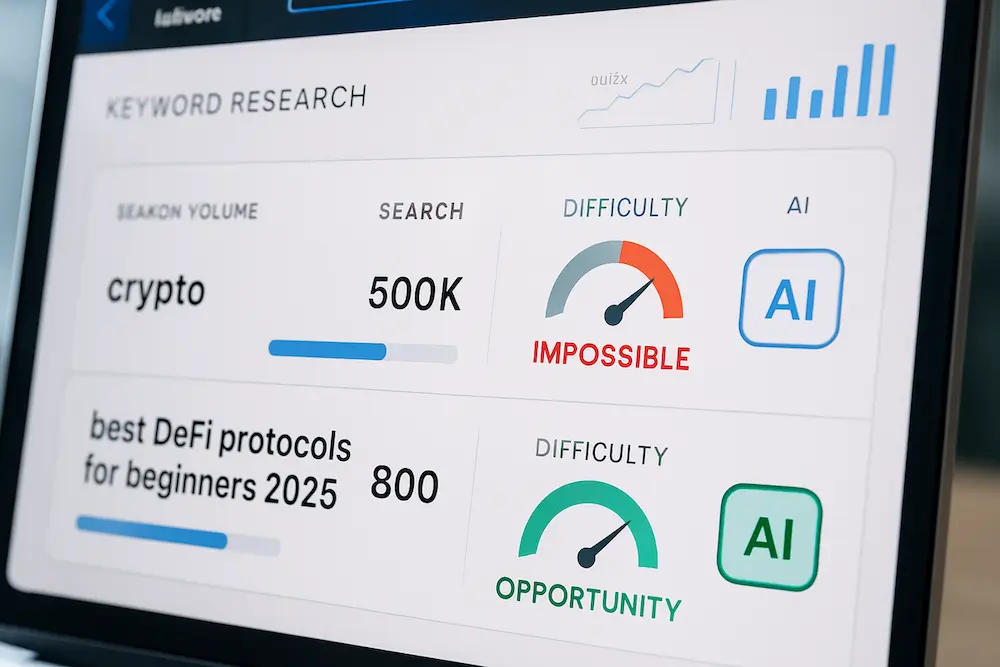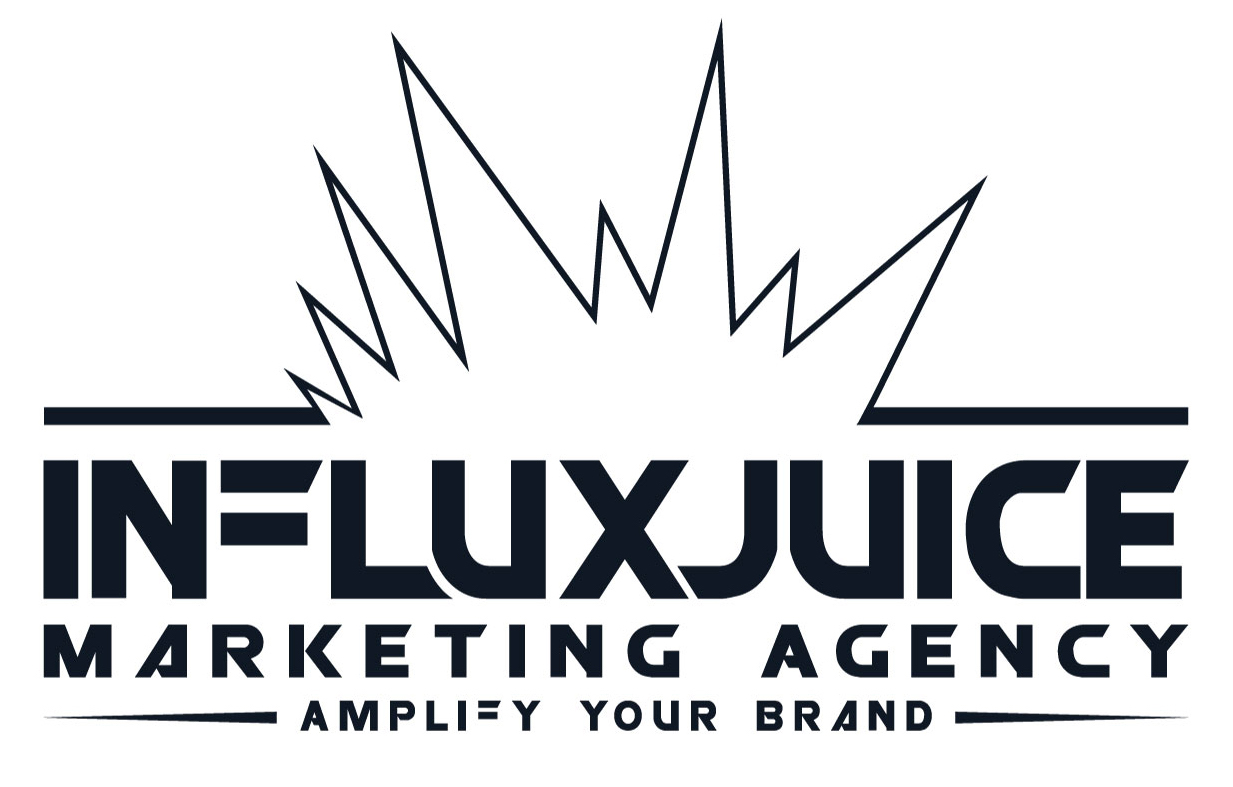Marketing agencies are scrambling to adjust their strategies. Search behavior is changing fast.
Traditional SEO still works. Google processes billions of searches daily. But smart agencies now optimize for both search engines and AI systems.
Here’s how forward-thinking agencies research keywords for this new reality.
The Shift: From SEO to SEO + GEO
Search Engine Optimization (SEO) targets Google, Ecosia, Bing, and traditional search engines. Most searches still happen here. Your website traffic depends on ranking well.
But Generative Engine Optimization (GEO) is the new frontier. People ask ChatGPT, DeepSeek, and Perplexity complex questions. These AI systems pull answers from websites to respond.
Marketing agencies on the pulse do both:
- SEO: Rank high on Google for traffic
- GEO: Get cited by AI systems for authority
Why High-Volume Keywords Still Don’t Work
Most businesses chase keywords with 50,000+ monthly searches. This fails in both SEO and GEO.
High-authority sites dominate these keywords. They have:
- Years of domain authority
- Thousands of backlinks
- Massive budgets
- Teams of experts
You can’t compete with that. Smart agencies focus elsewhere.
The Long-Tail Strategy That Works for Both

Long-tail keywords win in traditional search and AI responses. They have:
- Lower search volumes (100-1,000 searches)
- Less competition
- Higher conversion rates
- Better user intent
- Clearer questions AI systems can answer
Example:
- Bad: “crypto” (500,000 searches, impossible to rank, vague for AI)
- Good: “best DeFi protocols for beginners 2025” (800 searches, winnable, specific for AI)
The second keyword works for both Google rankings and AI citations.
Questions Are Gold for LLM Optimization
AI systems love answering direct questions. They scan content for clear, structured answers.
Smart agencies target question-based keywords:
- “How to choose a secure crypto wallet”
- “What are the best Web3 marketing strategies”
- “Why is my NFT not selling on OpenSea”
These queries appear in both Google searches and AI conversations. Optimize for one, win at both.
How Modern Marketing Agencies Research Keywords
The best agencies now research keywords for dual optimization:
Traditional SEO Research
- Target search engines like Google and Bing
- Focus on ranking for website traffic
- Use keyword difficulty scores
- Optimize for click-through rates
GEO Research (New)
- Target AI systems like ChatGPT and DeepSeek
- Focus on being cited in AI responses
- Look for question-based content gaps
- Optimize for answer accuracy and depth
Free UK Keyword Tools for SEO & GEO Research
1. Google Keyword Planner
What it offers: Search volume ranges, keyword ideas, competition levels Best for: Understanding search trends and getting basic data UK focus: Yes, you can filter by UK location Limitations: Shows ranges (1K-10K) not exact numbers, no difficulty scores
How to access: Sign up for free at ads.google.com
Google’s own tool is still the gold standard. It shows you what people actually search for in the UK.
2. Ubersuggest (Neil Patel)
What it offers: Keyword ideas, search volume, difficulty scores, related terms Best for: Beginners who want user-friendly interface UK focus: Location targeting available Limitations: Limited daily searches on free plan
How to access: Visit neilpatel.com/ubersuggest
Ubersuggest gives you difficulty scores. This helps you avoid impossible keywords.
3. AnswerThePublic
What it offers: Question-based keywords, prepositions, comparisons Best for: Finding questions people ask about your topic UK focus: Can target UK specifically Limitations: Limited daily searches, no difficulty data
How to access: Visit answerthepublic.com
This tool is perfect for finding question keywords. These are goldmines for content creation.
4. Keyword Tool
What it offers: Google Autocomplete suggestions, search volume, CPC data Best for: Long-tail keyword discovery UK focus: Location targeting available Limitations: No difficulty scores on free version
How to access: Visit keywordtool.io
Based on Google’s own suggestions. If Google suggests it, people search for it.
5. Keywords Everywhere (Browser Extension)
What it offers: Search volume and CPC data in your browser Best for: Quick research while browsing UK focus: Location filtering available Limitations: Limited free credits
How to access: Install from keywordseverywhere.com
See keyword data right in Google search results. Super convenient for quick checks.
6. SEMrush (Free Version)
What it offers: Keyword ideas, search volume, difficulty scores Best for: Advanced users who want detailed insights UK focus: Full UK targeting Limitations: Limited daily searches
How to access: Sign up at semrush.com
Professional-grade tool with generous free tier. The difficulty scores are accurate.
7. Moz Keyword Explorer (Free Trial)
What it offers: Keyword suggestions, search volume, difficulty metrics Best for: Accurate difficulty measurements UK focus: Location targeting available Limitations: 10 queries per month on free plan
How to access: Sign up at moz.com/keyword-explorer
Moz has the most accurate difficulty scores. Use your 10 queries wisely.
8. Soovle
What it offers: Keyword suggestions from multiple platforms Best for: Quick brainstorming across different search engines UK focus: Limited location targeting Limitations: No search volume or difficulty data
How to access: Visit soovle.com
Shows suggestions from Google, YouTube, Amazon, and more. Great for finding different angles.
9. Google Trends
What it offers: Search trend data, related queries, regional interest Best for: Understanding keyword popularity over time UK focus: Excellent UK-specific data Limitations: No search volumes or difficulty scores
How to access: Visit trends.google.com
Perfect for spotting seasonal trends and rising keywords. Use it to time your content.
10. Keyword Surfer (Browser Extension)
What it offers: Search volume and related keywords in Google Best for: Quick keyword research while browsing UK focus: Basic location targeting Limitations: Limited compared to paid tools
How to access: Install from keywordsurfer.com
Another browser extension that shows data directly in Google. Good backup option.
How Marketing Agencies Use These Tools Effectively

Step 1: Start with Seed Keywords
List 5-10 basic terms related to your business. For a Web3 marketing agency, try:
- “DeFi marketing”
- “NFT promotion”
- “crypto content marketing”
Step 2: Expand for Both SEO and GEO
Run each seed keyword through 3-4 tools. Look for:
- SEO opportunities: Keywords with decent volume and low competition
- GEO opportunities: Questions and conversational phrases
- Overlap: Keywords that work for both traditional search and AI systems
Step 3: Prioritize Questions for AI Optimization
Use AnswerThePublic to find questions. These become content topics that serve both:
- Google searchers looking for answers
- AI systems scanning for authoritative responses
Step 4: Check Dual Competition
- SEO competition: Use difficulty scores from Ubersuggest or SEMrush
- GEO competition: Search your questions in ChatGPT or Claude to see current answer quality
Step 5: Content Gap Analysis
- Traditional search: Check Google results for content gaps
- AI responses: Test questions in multiple AI systems
- Opportunity: Find topics where you can provide better, more comprehensive answers than current sources
Quick Comparison Table for Marketing Agencies
| Tool | Search Volume | Difficulty Score | UK Targeting | Question Keywords | Best for SEO/GEO |
|---|---|---|---|---|---|
| Google Keyword Planner | Ranges | No | Yes | Limited | SEO volume data |
| Ubersuggest | Yes | Yes | Yes | Some | SEO competition analysis |
| AnswerThePublic | Limited | No | Yes | Excellent | GEO question research |
| Keyword Tool | Yes | No | Yes | Good | Both SEO and GEO |
| Keywords Everywhere | Yes | No | Yes | No | Quick SEO validation |
| SEMrush | Yes | Yes | Yes | Good | Advanced SEO/GEO research |
| Moz | Yes | Yes | Yes | Good | Accurate SEO difficulty |
| Soovle | No | No | Limited | No | Multi-platform research |
| Google Trends | No | No | Yes | Limited | Trend analysis for both |
| Keyword Surfer | Yes | No | Yes | No | Simple SEO checking |
Pro Tips for Dual Optimization for Marketing Agencies
Research for Both Audiences
Your content needs to satisfy:
- Human searchers: Clear, scannable answers
- AI systems: Structured, comprehensive information
Combine Tools for Complete Picture
No single free tool covers both SEO and GEO needs. Smart agencies use:
- AnswerThePublic: For AI-friendly question research
- Ubersuggest: For SEO difficulty and volume data
- Google Trends: For understanding search evolution
- AI systems: For testing current answer quality
Structure Content for AI Citations
AI systems prefer content with:
- Clear question headers
- Numbered or bulleted answers
- Data and statistics
- Expert quotes and sources
- Step-by-step processes
Target Conversational Keywords
People ask AI systems like they’re talking to humans:
- “What’s the best way to…” instead of “best way”
- “How do I choose…” instead of “how choose”
- “Why does my…” instead of “why does”
Target Local Intent
Add location modifiers to your keywords:
- “blockchain developer London”
- “crypto marketing agency near me Manchester”
- “best DeFi conference Birmingham”
Focus on Commercial Intent
Look for buying signals in keywords:
- “best Web3 marketing tools”
- “cheap NFT promotion service near me”
- “DeFi platform review”
- “buy crypto advertising online”
Think Like Your Customer
What questions do they ask? What problems do they have? Your keywords should match their language, not industry jargon.
Common Mistakes for Marketing Agencies to Avoid

1. Focusing on High-Volume Keywords Only
High search volume doesn’t equal success. A keyword with 200 monthly searches that converts Web3 clients is better than 10,000 searches with no conversions.
2. Ignoring Search Intent
Match your content to what searchers want:
- Informational: “how to create an NFT”
- Commercial: “best Web3 marketing agencies”
- Transactional: “buy crypto advertising package”
3. Forgetting Mobile Users
Most UK searches happen on mobile. Think about voice search and conversational keywords.
4. Not Optimizing for AI Systems
Traditional SEO isn’t enough anymore. Test your content:
- Ask your questions to ChatGPT and Claude
- Check if AI systems cite your competitors
- Create content that AI systems want to reference
5. Ignoring the Dual Strategy
Don’t choose between SEO and GEO. Forward-thinking agencies optimize for both:
- Create content that ranks on Google
- Structure answers that AI systems cite
- Target keywords that work in both contexts
How InfluxJuice Stays Ahead
Marketing agencies that survive the AI shift adapt their keyword research. We optimize for both traditional search and AI systems.
Want to know which tools we actually use for our clients? Our 3-step playbook reveals exactly what we do in our marketing campaigns to get more traffic and higher rankings.
Just look at what we did for Rise in two campaigns:
- Domain authority: +1
- Organic traffic: +3.9k (+5.27%)
- Organic keywords: +3.2k (+34.41%)
- Backlinks: +2.6k (+40%)
Though we’d love to take all the credit, InfluxJuice is part of other SEO strategies that Rise uses.
These results come from finding keywords that work in both traditional search and AI responses. Our playbook shows you the exact process we use, including which tools work best for dual optimization.
The agencies that thrive in 2025 and beyond will master both SEO and GEO. Don’t get left behind optimizing for yesterday’s search behavior.
Ready to future-proof your keyword strategy? Get our 3-step playbook and see how we turn keyword research into traffic growth that works across all search platforms.
FAQ
What is Generative Engine Optimization (GEO)?
GEO is the practice of optimizing your online content so it gets selected and cited by AI-powered tools like ChatGPT, DeepSeek, Google Gemini, and Perplexity. It makes your brand more likely to be the recommended source when someone asks an LLM a question.
How is GEO different from traditional SEO?
Traditional SEO aims to rank your website higher in search engines like Google using keywords, backlinks, and on-page optimization. GEO focuses on structuring content and targeting questions in a way that AI models will reference your site directly in their answers. The best brands do both.
Why should marketing agencies care about being cited by ChatGPT or LLMs?
Consumers are increasingly using LLMs to find recommendations and answers, not just Google. If your brand isn’t referenced by AI tools, you risk being invisible in the new search ecosystem – even if your traditional SEO is strong.
How can I get my business mentioned in ChatGPT answers?
- Create authoritative, trustworthy content that answers common industry questions.
- Be featured in well-known directories and trusted lists.
- Earn mentions and links from respected sources.
- Use structured data like FAQ schema so AI can easily extract your answers.
What types of questions should I target for GEO?
Focus on natural, conversational queries – the way people talk to AI:
- “How do I get my company cited by ChatGPT?”
- “What are the best generative engine optimization strategies?”
- “Why isn’t my business recommended by AI search tools?”
These are prime questions for both Google and AI-powered answers.
Should I still invest in SEO if I’m doing GEO?
Yes. SEO and GEO work together. SEO helps drive traffic and authority in search engines, while GEO gets you recommended in AI-driven answers. Brands that combine both will win the most visibility in 2025 and beyond.
What are the key strategies for optimizing for LLMs like ChatGPT?
- Format content to answer specific questions clearly.
- Use FAQ and Q&A sections with schema markup.
- Earn credible backlinks and mention your brand in trusted resources.
- Regularly update and test your content by asking LLMs your target questions.
How do I measure success with GEO?
Metrics include:
- The frequency your brand is cited in AI-generated responses.
- Increased organic mentions from LLMs.
- Sustained ranking improvements for question-based, long-tail keywords.
Are there free tools to help research GEO-friendly keywords and questions?
Yes. Tools like AnswerThePublic, Google Keyword Planner, SEMrush, and Ubersuggest all uncover questions and gaps that AIs love to answer. Testing your content in ChatGPT and Gemini also helps you see if you’re getting cited.
Can GEO help my business get more clients?
Absolutely. By making your brand the “go-to answer” for critical industry questions, you’ll be cited by both search engines and AI assistants – putting your business in front of buyers right when they’re searching for solutions.
_________________________________________________________________
Get your business referenced on ChatGPT with our free 3-Step Marketing Playbook.
Want to know how we can guarantee a mighty boost to your traffic, rank, reputation and authority in you niche?
Tap here to chat to me and I’ll show you how we make it happen.
If you’ve enjoyed reading today’s blog, please share our blog link below.
Do you have a blog on business and marketing that you’d like to share on influxjuice.com/blog? Contact me at rob@influxjuice.com.
Latest Blogs
- Why Layer-2 Is the Secret to Affordable Blockchain Transactions
- Drive Better AI Conversations and Grow Your Business with Convolytic
- Step-by-Step Guide to Launching a DAO With Real Governance Incentives
- WebinarGeek + InfluxJuice: A Practical Route from Webinar Sign-ups to Sales
- How Web3 Gaming Economies Reward Players With Tradable Assets

